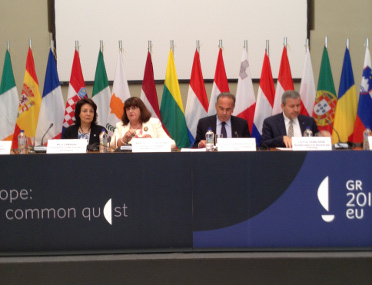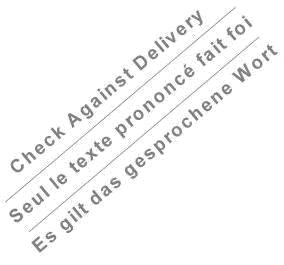Keynote address on Blue innovation at the Informal Competitiveness Council

Commissioner Damanaki adressed today the European Ministers attending the Informal competitiveness Council and presented the Commission's recently adopted new communication on Blue innovation. Read Commissioner Damanaki's remarks below.

Presentation of the Communication on innovation in the Blue Economy at the Informal Competitiveness Council
Athens, 13 May
Ministers,
The EU's maritime economy, or "blue economy", is changing. As traditional industries such as fisheries and shipping modernise, new ones emerge, such as marine biotechnology and offshore renewables.
There is a potential for new jobs and growth here, and we want to ensure that the EU does not miss out. The maritime sector already employs 5.4 million people across Europe. But it could employ 7 million by 2020. And that is where the opportunity for Europe lies in these challenging times.
We want to encourage investment and, at the same time, protect the sea from any man-made harm.
About eighteen months ago we launched our blue growth initiative. We look at specific areas where we think there are opportunities to seize, such as aquaculture, blue biotechnology… ocean energy… and coastal tourism. And we provide the best possible operational conditions for businesses.
This is why last week together with Commissioner Geoghegan-Quinn we presented a targeted Action Plan that provides the building blocks. We will be able have the knowledge and skills to better manage our oceans, drive innovation in the maritime economy and exploit our waters in a sustainable way.
First, we will reinforce our work on marine data and create a seabed map of European seas by 2020. This is a process we started four years ago. The idea was even more successful than we had hoped.
Prototypes are already running, and now more than 100 organisations have joined together and make their data available through a common web portal. And we have targeted funding under the European Maritime and Fisheries Fund to continue this work.
But why, you may wonder. What for?
Well, there are a number of benefits. Private companies, public authorities and researchers will not have to pay for information on fish stocks, ocean forecasting or coastal protection: it will be free of charge. So they will keep doing what they do, but more cheaply.
And their investment will be subject to less risk. For instance more accuracy in sea-level rise predictions will help companies and public authorities plan more effectively.
In sum, Ministers, we have calculated the economic benefits of this at more than one billion euro a year.
We have closely coupled this initiative to the Copernicus earth observation programme. We will complement the measurements made from space with those made in the sea. And we also intend to bring in measurements from the private sector. There are more than 5000 wind turbines in European seas, collecting data that are not commercially sensitive and can be made available for science.
Second, we need to improve communication amongst the different groups working on marine research. There are marine issues in nearly all Horizon 2020 policy areas – food, energy, transport – as well as in the enabling technologies – new materials, biotechnology, information technology. There is also a specific Blue Growth Focus Area in Horizon 2020 devoted specifically to the blue economy.
But insights gained in one should feed others. For instance, preventing biofouling on ships may also help us design better aquaculture cages or tidal energy turbines.
We will therefore be setting up a marine research platform that helps researchers understand opportunities all across the Horizon 2020 programme. It also allows potential investors to spot developments that could lead to new products and services in the blue economy and beyond. We will be inaugurating a new Blue Economy Business and Science Forum to further promote cross-fertilisation of ideas.
Third, we need to do something about skills. Despite the unacceptable levels of unemployment, many companies, particularly in the engineering sector, tell us that they cannot get enough trained staff – not only graduate engineers but also welders or electricians. The EU's Erasmus programme has now been extended to allow transnational partnerships among education, training and youth institutions. We are hoping this will promote skills in the blue economy.
I have skipped through the ideas, but I do invite you to read the Communication. It is an important one. Máire and I received strong input, support and backing from other EU policy areas – particularly from Vice President Tajani, who is responsible for the Copernicus space programme, and from Commissioner Potočnik, who needs better information about the sea in order to ensure that our blue economy is sustainable.
We must make sure that Europe is ready: by setting up the infrastructure, by training the workforce, by modernising the legislation.
I welcome your comments and feedback.


